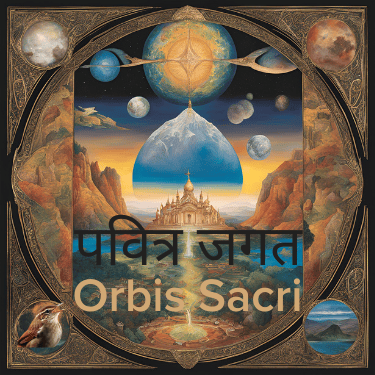A regenerative business fuelled by compassion

Highlights:
Ethical orientation
Employee care, personal development and kinship
Community Investment helps the Disadvantaged Thrive in Rural India
Environmental Regeneration is an essential component of Jaipur Rugs’ business approach
Jaipur Rugs’ Creative, Innovative and Resilient Culture
A Collaborative, Ecosystem Based on Shared Values
The term regenerative, barely does justice to Jaipur Rugs
Background of my regenerative research
Over the last two years, I have been busily exploring the phenomenon of the regenerative business.
Having spent over thirty years in the IT industry, like many, I had succumbed to the view that businesses were primarily transactional. And, as an employee, provide somewhere to work to earn a living and, generally, places to forget at the weekend. Implicit in the West’s angst about work/life balance is this disconnect between people’s lives at home and work. As you will read, Jaipur Rugs is fundamentally the antithesis of this common western work/life balance dilemma because it provides what many of us have vainly sought: a higher purpose.
My work as an IT industry analyst wasn’t dispiriting, but it was also nothing to shout about in the company of friends at my local pub. My job during the week was sometimes intellectually stimulating. It was, however, never inspiring — until the summer of 2022 when I attended an analysts’ gathering hosted by Zoho Corporation in Austin, Texas. Technology companies commonly host analyst events to influence analysts to write upbeat reports on their latest products. This one was very different as it focused on Zoho’s regenerative business philosophy, of transnational localism, which struck a chord with me.
At last, something for my soul to chew on. Business could be more than transactional and soulless.
It reminded me of the old Quaker company, Cadbury, founded in 1824 by John Cadbury and later run by his sons, George and Richard. In 1879, they built a factory with 16 houses for its workers. By 1902, 30% of the company’s capital was invested in workers’ welfare. More was to follow, including a school playing area and the town of Bournville, near Birmingham, UK. While it produced and sold chocolate, its business philosophy was not transactional but inspired by the Cadbury family’s Quaker Christian beliefs.
In February 2023, I was invited to Zoho’s HQ in Chennai, India, along with a dozen other analysts. I came not to hear about their software products but to gain a deeper understanding of their regenerative business philosophy, inspired by compassion born of Vedantic Hinduism.
Since my return home, I have dedicated my working week 100% to regenerative research, especially finding regenerative companies to highlight and inspire others. One such company, coincidentally from India, is Jaipur Rugs.
It more than matches my basic definition of a regenerative business — one that systematically and symbiotically creates value for all stakeholders, including communities, all life, and our planet.
Jaipur Rugs — the background
Jaipur Rugs was founded in 1978 by Nand Kishore Chaudhary in Churu, Rajasthan, Northwestern India. NK Chaudhary took out a small loan from his father to buy a bicycle, and two looms used by nine artisan rug weavers. Today, Jaipur Rugs is one of the world’s largest manufacturers of hand-knotted rugs. It employs 40,000 artisans, primarily drawn from impoverished rural communities. Today Jaipur Rugs exports to over 60 countries.
Jaipur Rugs is a wholly owned family business without external shareholders’ influence. His five children support him. His eldest daughters, Asha and Archana, are CEO and COO, respectively, at Jaipur Living, a subsidiary in the US. Kavita, the middle child, is now the Design Director with her label, ‘Kavi’. Yogesh, his elder son, is the director of sales and marketing, while Nitesh, the younger son, is the supply chain and IT director, collaborating with the US and India teams.
Looking through the lens of regenerative attributes
Having spent the last two years researching the regenerative landscape, I’ve distilled the attributes into five integrated components drawn together by an underlying ethical purpose, outlined in figure 1.
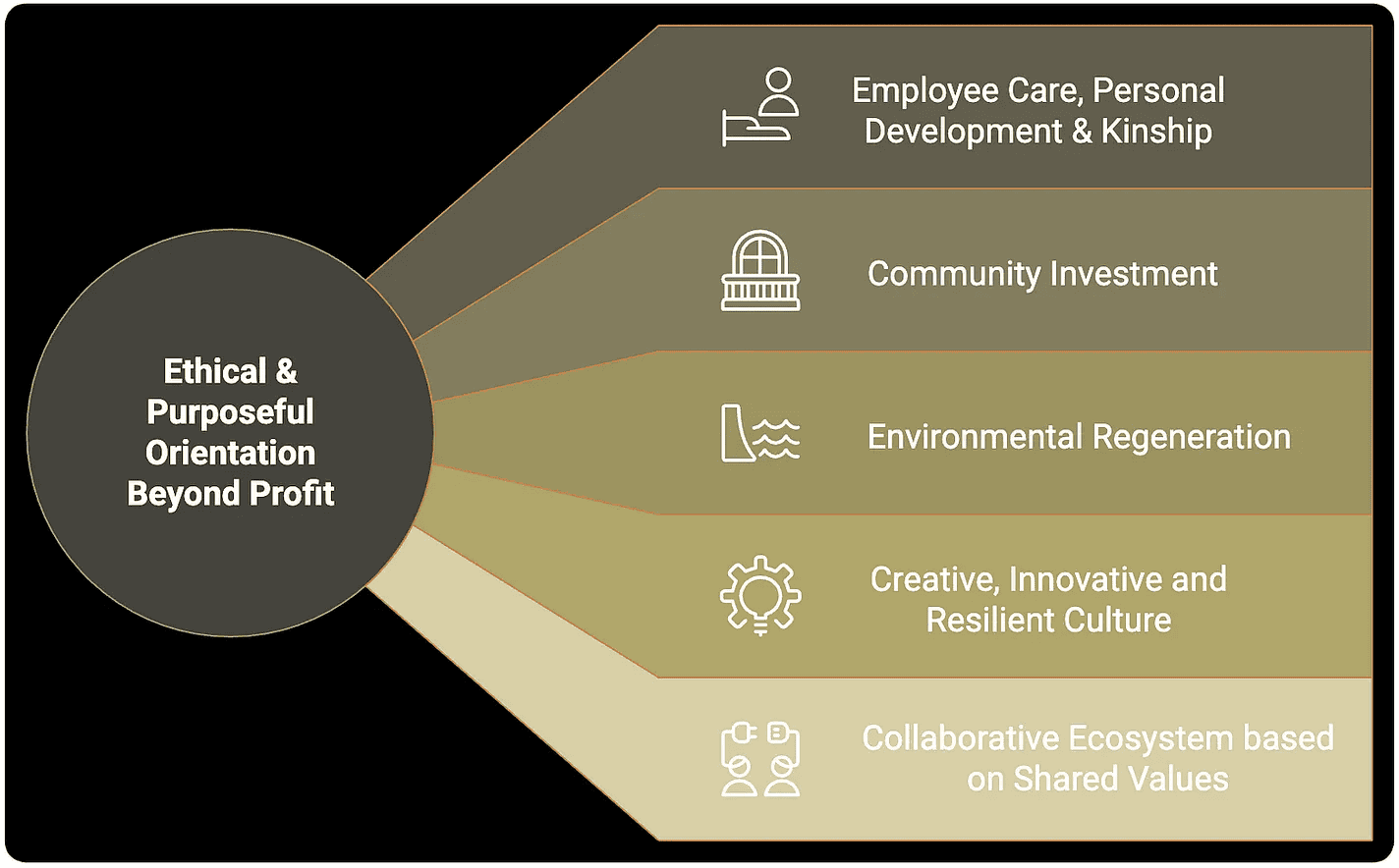
This provides a lens through which to examine any company to determine if it is regenerative and to what extent.
A regenerative company’s driving force is its ethical purpose, transcending the typical profit motive of most extractive, transactional businesses. This purpose impacts employees, communities, the environment, innovation and resilience, and the ecosystem of suppliers and partners. The impact of its purpose can vary across each attribute, but without them, a company will never be regenerative. It demands a more evolved level of consciousness beyond the pursuit of profit and wealth.
This lens helped me analyse Jaipur Rugs as I researched the company, predominantly through its website, blogs and the Jaipur Rugs Foundation. This will not do it justice, as it can tell so many stories, enough to fill a book. Here is what I found.
Jaipur Rugs through the Regenerative Lens
Understanding the purpose and values of Jaipur rugs is critical, as everything else flows from them.
Ethical & Purposeful Orientation Beyond Profit
N.K. Chaudhary has been called the ‘Gandhi of the Carpet Industry’ with good reason. One of NK’s characteristics that first caught my eye was the title of his HR department: ‘the Search for Divine Soul’. I’ve always had a jaundiced view of HR as a corporate tool to ensure that employees are standardised to fit specific roles within a company, like cogs in an elaborate dehumanising machine. The Search for Divine Soul has been instructed to ignore age or clothes, and instead find innocent people with divine souls. NK’s perspective reflects a very personal spiritual quest:
‘Everybody has a compass in himself given by God. The voice comes from inside, telling me I am on the right path. To run my business successfully, I need people with similar philosophies. If we love what we do and love people, the rest will look after itself.’
A champion of rural communities and ancient artisanal skills
The rest, such as growth and profits, have taken care of themselves. From the start, NK believed in people’s innate creativity within the surrounding rural communities. Ancient artisanal skills developed over at least 2,500 years were still being practiced, but with little reward. Intermediaries controlled the prices and earned substantial profits on the backs of rural weavers, barely able to support their families.
NK did not head to the city or dream of making money by building factories for mass-produced carpets. He recognised the value of traditional weaving skills and the importance of nurturing them in remote rural communities to develop beautiful carpets and rugs.
This approach counters the community-draining trend of urbanisation, driving young adults to the big cities in search of jobs.
Eliminating the intermediaries, working in person with rural artisans, and selling directly to markets around the world improved the living standards of people experiencing poverty, especially women. Today, women comprise around 85% of the workforce, a massive win for women in rural communities.
The Antidote to AI and Automation
At a time when AI and automation threaten today’s white-collar livelihoods, NK’s investment in Indigenous artisanal skills provides hope to others for a future of work that AI and automation cannot touch.
Imagine if every country identified its Indigenous artisan skills and brought them back to life. There is a massive market for authentic original products. Fortune Business Insights values it at over US$1 trillion in 2025, and predicts it will at least double by 2032.
Since the mid-twentieth century, the white-collar conveyor belt of degree-led education may already have reached its zenith. The drive for efficiency in business has stunted creativity and led to commoditisation and sameness. Once necessities are covered, humans hunger for beauty, not drudgery. Unleashing the artisan, provides beauty and purpose to satisfy our innate spiritual longing. Jaipur Rugs, shows us the way.
NK’s spiritual purpose is manifested through five core values
Empathy — right from the beginning NK spent time with tribal artisanal weavers to understand their daily struggles and work out how best to support them. Often treated as untouchables, NK offered them respect, invited them into his home and treated them with dignity and empathy.
Simplicity — NK believes that we become simpler through self-discovery and a beautiful story emerges by combining this simplicity with others.
Integrity — flows from authenticity and simplicity. As we connect with our deeper selves we discover our purpose. NK’s experience working with the artisan weavers taught him that their simplicity and honesty shone in the quality of their work, which came from the heart and creative imagination.
Shared Wisdom: NK recognised that combining his business acumen with the weavers’ knowledge, experience, and skills created a harmonious and creative partnership for everyone’s benefit.
Humility — NK sees his business as part of a greater whole. Everyone is vital to the success of the whole. The simple truth is that Jaipur Rugs would not exist without artisans and customers. Therefore, the relationship is not transactional or exploitative but naturally symbiotic.
In his words:
‘’Businesses will become whole through what they are missing; love, compassion, and healing. They are whole when the artisan and customer are connected, completing the ecosystem.’’
These are immutable values that endure and inspire. They are the essence of Jaipur Rugs’ continued success, while many other carpet manufacturers have disappeared.
Employee Care, Personal Development and Kinship
While many CEOs pay lip service to the importance of their employees, NK (now president) has always believed in the unique value and potential of every individual who works for Jaipur Rugs. His search for ‘divine souls’ and individual fulfilment reflect this strong belief:
’’ My mission is to connect our artisans to themselves by nurturing their creative capacity. They are empowered to fulfil their aspirations and live a dignified life.’’
NK and his family share this belief. For them, Jaipur Rugs is not about enrichment but a sacred mission that comes to life through its impact on artisans, their families, and the many forgotten rural communities struggling to make a sustainable living. Many artisans share their knowledge and skills with others, extending the positive impact in their communities and deepening kinship, inspired by a common cause.
Education and Healthcare provided by JRF lift the poor and foster kinship
NK firmly believes business is a purposeful way of life built on relationships and family and bringing out the best in everyone. Building close, personal bonds with village communities through education and skills development creates kinship that benefits the ecosystem from weavers to customers. As NK said:
‘When everyone reaches their full potential, the entire society is uplifted. ’
Anju Devi, Artisan in Aspura, Rajasthan articulated this beautifully when she said:
“Ever since we started working with Jaipur Rugs Foundation, it has given us a lot of courage, financial Independence and helped us gain dignity along with self-confidence. It has given us a voice and helped us overcome our fears. I could never imagine that I would be able to speak so freely in front of so many people, without my veil.”
(Source: Annual Report 2022 -23, Jaipur Rugs Foundation).
It is more than a job for artisans such as Anju Devi; it becomes a way of life and personal growth. A meaningful vocation that brings confidence and joy to life, that might otherwise have suffered the indignity of relentless poverty, powerlessness and humiliation.
Community Investment helps the Disadvantaged Thrive in Rural India
In 2004, NK founded the Jaipur Rugs Foundation (JRF)1, a non-profit, whose mission is to serve as a social innovator supporting artisans by providing them with job opportunities to uplift rural communities. Its vision is to create a society:
‘’ where equality, justice and peace prevail through socio-economic development’’.
JRF operates in five northern Indian regions, supporting rural communities and artisans in Rajasthan, Gujarat, Uttar Pradesh, Bihar, and Jharkhand.
By living the core values, JRF has benefitted over 3.5 million people in 812 villages. Nearly 55,000 opportunities have been created, and almost 1.5 million villages have received door-to-door healthcare.
JRF field workers spend time in these remote villages, learning about each village and its people’s unique circumstances. This allows JRF to build trusting relationships and determine how best to support the communities rather than attempting to impose a templated solution.
Empowering Rural Women through WELL
The WELL program (Women Empowerment through Livelihood & Leadership) was established to counter inequality and the lack of inclusivity and opportunities for women, especially in rural areas. Lockdowns during the COVID-19 pandemic exacerbated the unfairness, so JRF partnered with other agencies to counter these inequities in Rajasthan and Uttar Pradesh. The aim was to teach women in rural areas the art of hand-knotted carpet weaving.
The underlying principles of the WELL program (outlined in Figure 2) are to eliminate the need to migrate to larger towns or cities by providing local self-employment, timely and fair wages, and develop leadership skills to help women flourish in their communities. Jaipur Rugs’ value chain and access to global markets would ensure that opportunities expand and provide increased financial security.
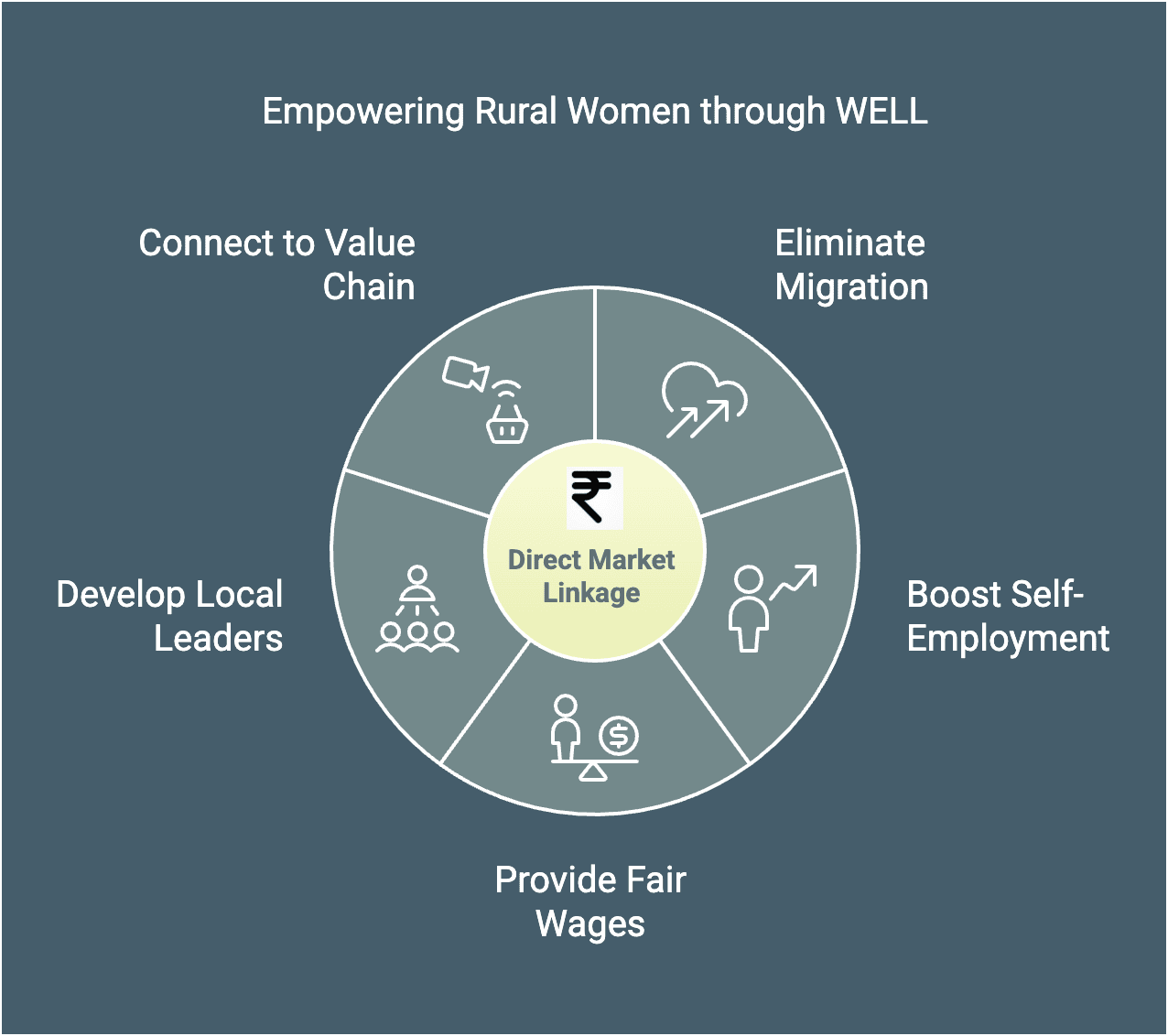
Through training, skills development, and the WELL program, Jaipur Rugs is making a substantial and positive impact in rural communities, especially for women. For example, Saroj, a former stone worker in Tigariya village, increased her monthly income from an average of Rs. 2000 -3000 to RS. 8000 after six months. This has significantly improved the family’s finances, and she and her husband envisage rebuilding their home in brick and providing better education for their children.
Environmental Regeneration is an essential component of Jaipur Rugs’ business approach
JRF actively supports six of the UN’s SDGs, (sustainable development goals), each impacting communities.
SDG1 — No Poverty — 40,000 artisans now benefit from a sustainable income in rural communities. This is vitally important, helping maintain communities and prevent city migration. Skills training is provided to help them start quickly.
SDG 3 — Good Health and Wellbeing — provides door-to-door health checkups, medical help, and preventative hygiene and sanitation guidance. By eliminating the need to travel, time and money are saved.
SDG 5 Gender Equality — An Alternative Education Program enables women to play a more prominent role within their village communities. This counters the traditional gender bias towards men.
SDG 8 Decent Work and Economic Growth — JRF works to increase local self-reliance and self-management through training and skills development. Working for Jaipur Rugs provides artisans with a regular and fair income, typically more than sporadic manual or seasonal farming work. It is not unusual that weavers may double or even triple their earnings once fully productive.
SDG 12 — Responsible Consumption and Production — The Manchaha initiative, outlined in a later paragraph, involves reusing leftover hands-on yarn that would otherwise go to waste. The business model creates work opportunities where people live rather than setting up regional factories that harm the environment and rural communities.
SDG 17 — Partnerships for the Goals: JRF works closely with partners globally, positively impacting rural communities and environmental sustainability.
Five SDGs concern people, and number 12 concerns the business’s environmental impact. Jaipur Rugs’ ecological footprint is modest by design.
No factories consume energy or extract minerals and other subterranean resources. It doesn’t pollute the environment with chemicals, and its 40,000 artisans do not need to travel to any regional or centralised workplace.
Rather than being siloed goals, Jaipur Rugs and JRF’s operations simultaneously impact all six SDGs, aligning with their holistic philosophy.
Jaipur Rugs’ Creative, Innovative and Resilient Culture
Jaipur Rugs flourishes by taking creative inspiration from nature and producing many highly desirable and unique pieces. As a family-owned company, Jaipur Rugs is not answerable to external shareholders. It can and has plotted its path and remained true to its values. Many corporations worldwide have lost their powers of innovation, relying on mergers and acquisitions to generate quick growth or share buy-backs to boost their stock prices. Jaipur Rugs encourages creativity among its 40,000+ artisans.
Kavita Chaudhary, Design Director states:
’’ Beauty is something that nature has already defined. All the contrasts, all the brightness, all the layers.’’
She believes we can create something that echoes nature’s beauty by following our innate intuition rather than a prescribed design. This attitude and company values stimulate design innovation and perpetuate a highly resilient culture. The hunger for tactile beauty is timeless and will always be prized above mass-produced products.
Creativity overcomes commoditisation creating resilience
The uniquely personal craftsmanship of each artisan, allied to continuous innovation in 3000+ colours and fibres, makes the variety of carpets virtually limitless. The risk of commoditisation through automation is negligible. The passion and creativity of individual artisans allow each to lose themselves in their work, as mind, body, and heart combine to create works of art.
This finds its ultimate expression in Manchaha — a Hindi word meaning ’expression of my heart’. Individual weavers are encouraged to use their creativity and inspiration to make unique works of art. Kavita Chaudhary applied the concept to rug design, winning eight international prestigious design awards. Each rug uses leftover hand-spun yarn batches, fostering sustainability and waste reduction. These Manchaha rugs are much prized for the unique stories they embody through the expression of the weaver’s heart. Weaver and designer Manju Devi, from Dhanota village near Jaipur, won four awards for her Manchaha rug, inspired by her surroundings.
This is resoundingly purposeful and in keeping with the company’s philosophy of totality, celebrating individual uniqueness and self-discovery through work.
This encouragement of personal growth enriches the lives of the weavers and their communities and creates something uniquely beautiful for customers. It offers timeless resilience, contrasting with economic commoditisation through industrialised mass production or mass customisation.
High quality through craftsmanship and expert production methods
The hand-crafted rugs and carpets follow a five-stage process outlined in Figure 3. When a rug is complete, it will have passed through 180 hands, a far cry from mass-produced carpet manufacturing.
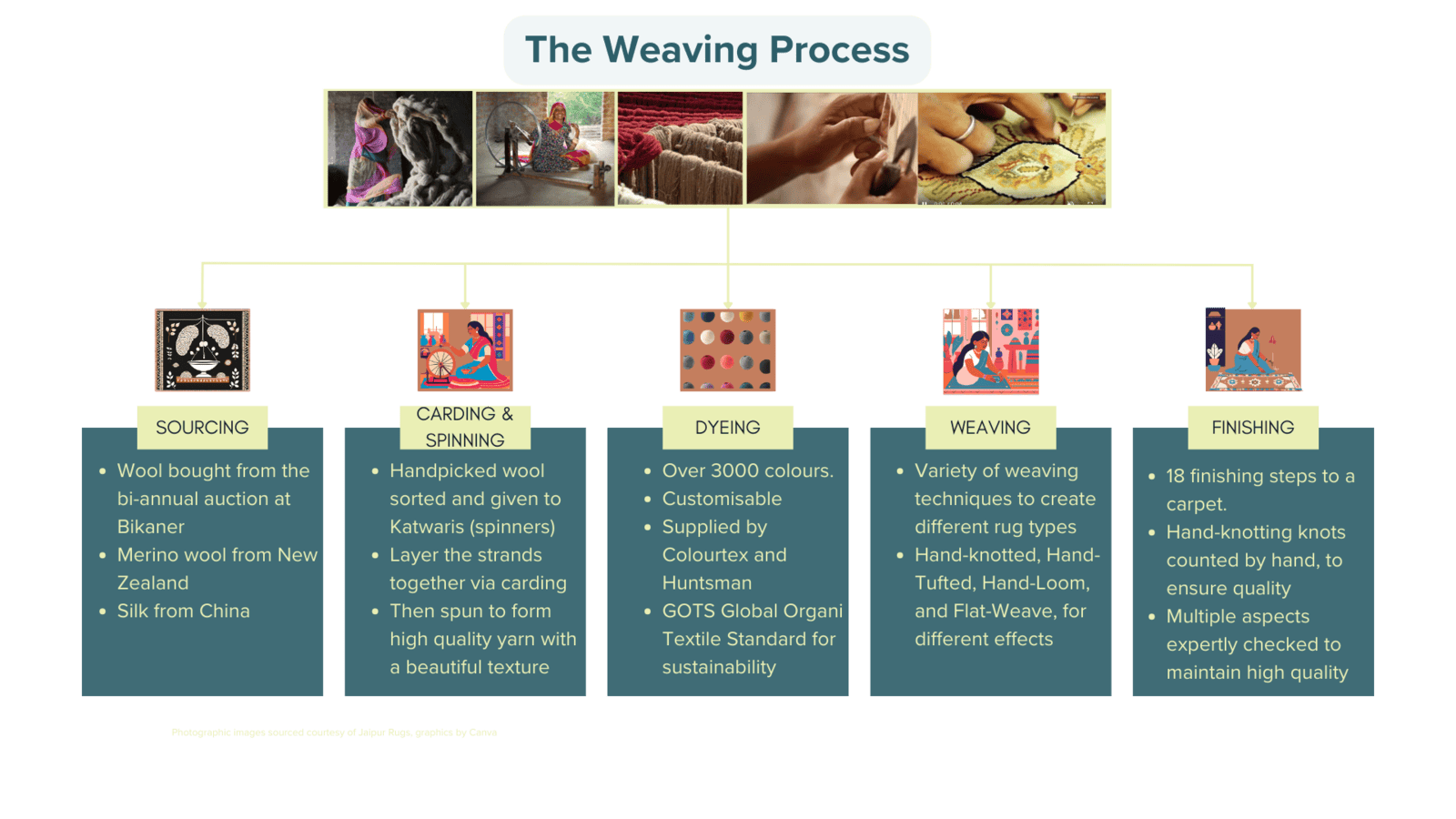
A Collaborative, Ecosystem Based on Shared Values
Jaipur Rugs is predicated on collaboration across a growing global ecosystem.
Figure 4 outlines the socio-economic business model of Jaipur Rugs, educating rural artisans, supplying them with raw materials and a sustainable, dignified living, and exporting their rugs worldwide.
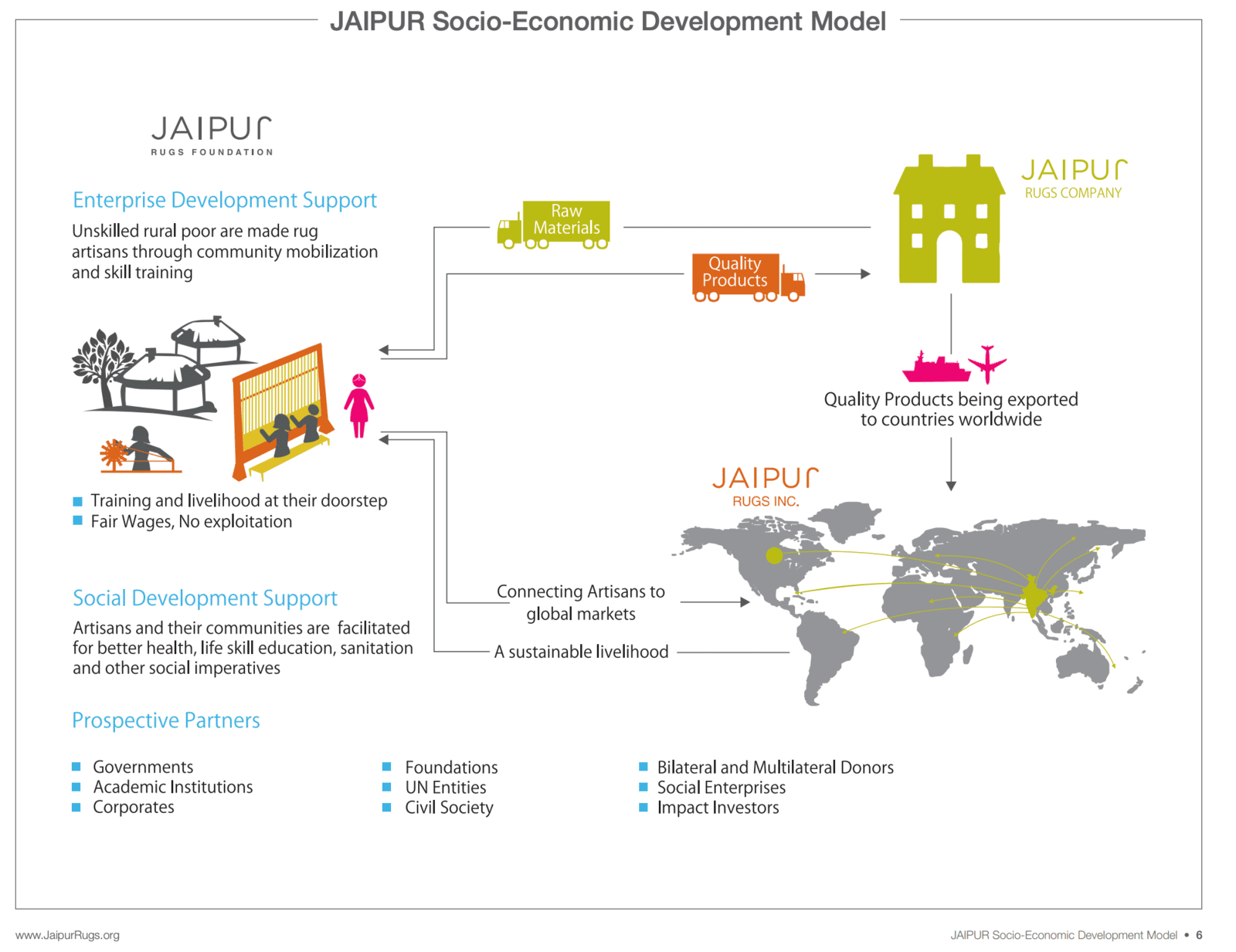
Jaipur Rugs operates 19 stores worldwide, including Dubai, London, and Singapore. It also has three showrooms in the US: two in Georgia, in Acworth and Atlanta, and one in High Point, North Carolina.
Collaboration is a purposeful JRF strategy
NGO and government agency partnerships increase the positive impact on Indian rural communities. Examples include:
JRF partnered with Pehel Foundation, a subsidiary of PNB Housing Finance Ltd., to preserve folk art and weaving craftsmanship and provide sustainable incomes in the most vulnerable communities in Jaipur District.
A partnership with the Rajasthan Royal Foundation and the Muthoot Pappachan Foundation has enhanced economic opportunities, transforming women’s lives in some of Rajasthan’s most impoverished villages. A Social Innovation & Design Lab was established to harness the creativity of local artisans, improve employment prospects, and preserve traditional craftsmanship. By understanding yarn quality selection and dyeing techniques, women have been empowered to create locally inspired rugs, which were showcased at an Aspura exhibition
- The Aatmanirbhar Bharat Centre for Design was established to promote Indigenous crafts with the support of the Indira Gandhi National Centre for the Arts, the Ministry of Culture, and the Government of India. Jaipur rug weavers showcased their Manchaha rugs at the Red Fort Gallery, inspiring 120 artisans to participate in the initiative, unleash their creativity, and produce 124 rugs.JRF established The Jail Project, training 125 inmates to weave rugs and offering them hope of securing meaningful employment upon their release. A collaboration with the Dr. Pankaj Singh Foundation and NIMS University enables JRF to provide health cards, allowing artisans to access free healthcare across various districts in Rajasthan.
In collaboration with the Lenskart Foundation, JRF has trained a selected group of women in each village to become dedicated vision ambassadors (Drishti Didi) who help villagers access eye care services and perform basic eyesight tests.
These are just a small selection of how Jaipur Rugs’ collaborative ecosystem works to improve artisans’ lives in rural Northwestern India and provide them with dignity and hope. At its heart is an extraordinary level of compassion.
The term regenerative, barely does justice to Jaipur Rugs
Like many analysts raised in the West, I accepted the term regenerative to describe a business that, in effect, gives more back to the world than it takes. I’ve fallen into the trap of arid ‘business-speak’. However, researching Jaipur Rugs has revealed that it is a company driven by compassion. That compassion results in its regenerative capabilities and outcomes. This begs the question, can a business be regenerative without compassion?
I don’t believe it can. Companies like Jaipur Rugs and Zoho exhibit highly compassionate behaviours.
In Figure 1, I identified an ethical and purposeful orientation as the starting point for a regenerative business. In researching Jaipur Rugs, I learned that the word ‘compassionate’ must be added. Without that spiritual essence, a company will be partially regenerative or at risk of losing its way and diluting its purposeful orientation. The risk increases from generation to generation. That is what happened to Cadbury, which after 200 years sold out to Mondelez International Inc.
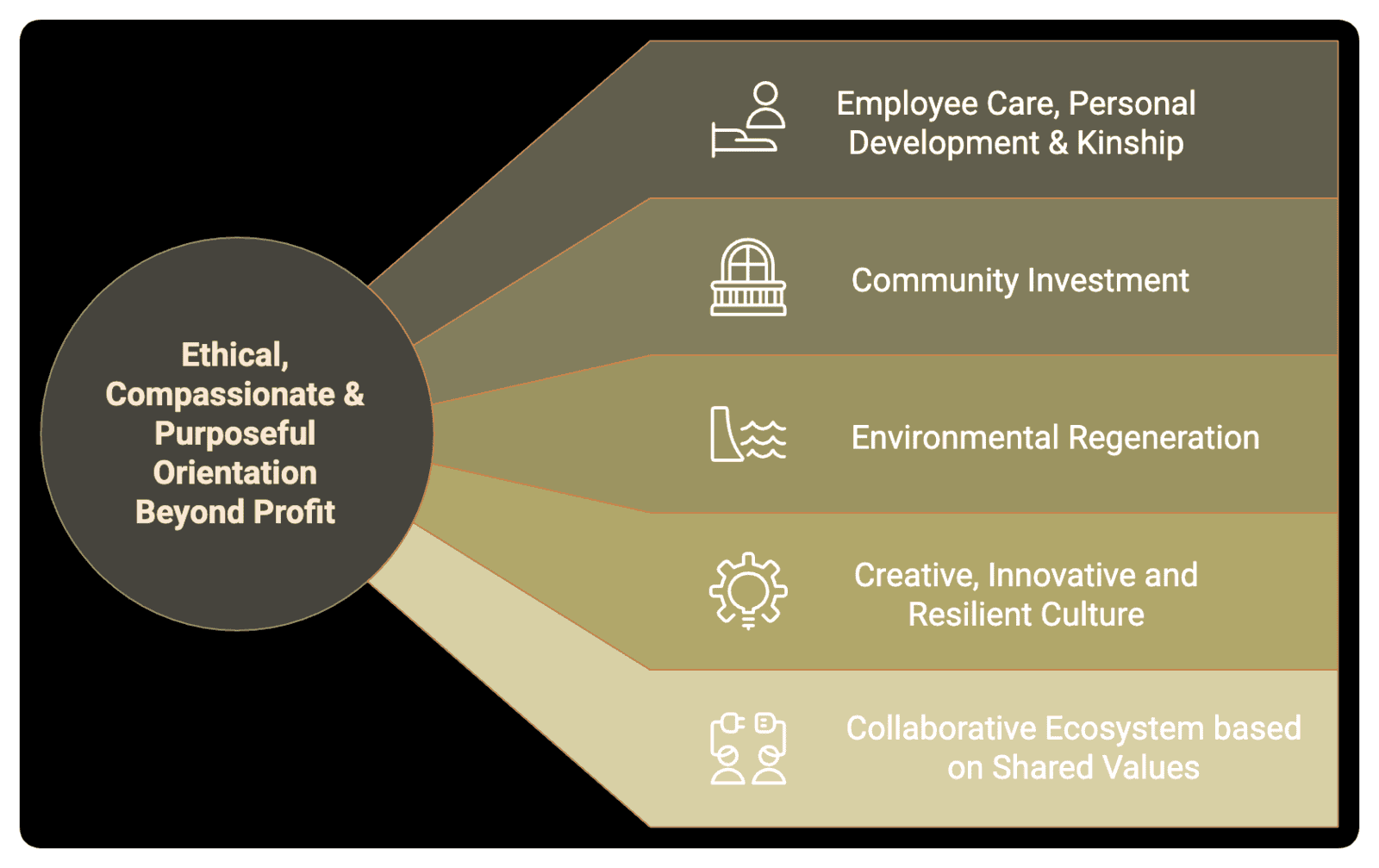
As NK said:
“Let goodness, fairness and most importantly, love prevail in business; profits will inevitably follow.”
Or as Asha Chaudhary, CEO of Jaipur Living in the US put it in an interview with Impact Wealth, October 2024:
‘Profit through love.’
The company’s long-term vision is to mould a society of equality, justice and peace through opportunity and socio-economic development. Compassion provides the essential fuel. Jaipur Rugs is a shining example of what is possible when companies are run for the value they bring to people, communities, all life, and our sacred yet much-maligned planet. Long may it continue. And for the sake of future generations and the planet, may other businesses reach this level of consciousness.
